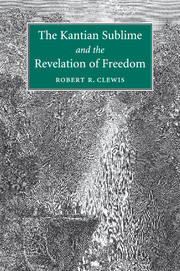Book contents
- Frontmatter
- Contents
- Preface and acknowledgments
- Abbreviations and notes on Kant's texts
- Introduction
- 1 The Observations and the Remarks
- 2 The judgment of the sublime
- 3 Moral feeling and the sublime
- 4 Various senses of interest and disinterestedness
- 5 Aesthetic enthusiasm
- 6 Enthusiasm for the idea of a republic
- 7 Conclusion
- Appendix 1 On the Remarks
- Appendix 2 Some features of the feelings discussed in this book
- Appendix 3 Classification of what elicits sublimity
- Bibliography
- Index
Introduction
Published online by Cambridge University Press: 02 July 2009
- Frontmatter
- Contents
- Preface and acknowledgments
- Abbreviations and notes on Kant's texts
- Introduction
- 1 The Observations and the Remarks
- 2 The judgment of the sublime
- 3 Moral feeling and the sublime
- 4 Various senses of interest and disinterestedness
- 5 Aesthetic enthusiasm
- 6 Enthusiasm for the idea of a republic
- 7 Conclusion
- Appendix 1 On the Remarks
- Appendix 2 Some features of the feelings discussed in this book
- Appendix 3 Classification of what elicits sublimity
- Bibliography
- Index
Summary
In 1797, approximately seven years after Kant published the Critique of the Power of Judgment, the Grand Prix de Rome in history painting was awarded to Louis-André-Gabriel Bouchet for illustrating the death of Cato of Utica (95–46 bce). Cato the Younger, or Marcus Porcius Cato Uticensis, was renowned in the eighteenth century for having stabbed and killed himself upon learning that the Republic was lost to Caesar. As inspection of the painting reveals, Bouchet presents us with a defiant Cato, full of scorn and unafraid of death. He looks like a man who is free, and who knows it.
In 1764, Kant describes Cato as an exemplar of enthusiasm. Like Bouchet, Kant characterizes Cato as a symbol of freedom. Enthusiasm (Enthusiasm or Enthusiasmus, not Schwärmerei), the pre-Critical theory maintains, is the passion of the sublime. Enthusiasm takes principles that are good in themselves, such as freedom, to an excessive degree. Kant even goes so far as to say that without enthusiasm nothing great can be achieved. At the same time, Kant condemns Cato's suicide as taking a good principle, freedom, and applying it in the wrong way. Of course, it is precisely the features of Cato's suicide itself that so forcefully demonstrate Cato's freedom. Cato defiantly shows that he is free even to take his own life and thus to rise above his sensible interests, above all the interest in self-preservation. His demonstration of freedom is partially what, for Kant, makes Cato's act a demonstration of sublime enthusiasm.
- Type
- Chapter
- Information
- The Kantian Sublime and the Revelation of Freedom , pp. 1 - 31Publisher: Cambridge University PressPrint publication year: 2009



